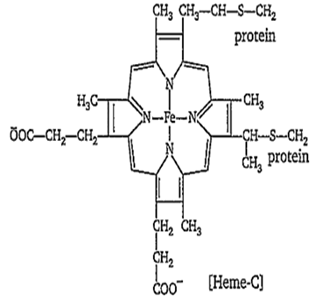 Multiple Choice Questions
Multiple Choice QuestionsWhich of the following food-stuffs contains nitrogen?
Carbohydrates
fats
Proteins
None of these
Which of the following statements is true?
Denaturation of protein changes the primary structure of protein
All proteins act as biocatalyst
C-terminal amino acid in proteins is determined by Edman degradation
The pleated sheet structure of proteins was determined by Pauling
Which of the following is involved in formation of heme?
Lysine
Glycine
Tryosine
Arginine
B.
Glycine
Heme is the prosthetic group of hemoglobin, myoglobin and cycochromes. It is an asymmetric molecule.

The heme ring system is synthesised from glycine and succinyl -CoA. It begins with condensation of glycine and succinyl -CoA with decarboxylation to form 8-aminolurilinic acid (ALA).
